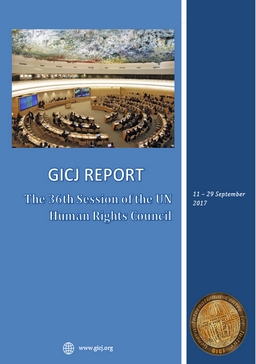29.10.2018
Contents
- Introduction
- GICJ’s Participation at the Human Rights Council
- Oral statements
- Written statements
- A Look into Modern Day Slavery
- Aid Workers, Children in Armed Conflict, and Statelessness in South Sudan
- Basic Law: Israel as the Nation-State of the Jewish People
- Burundi – Acts of Violence, Intimidation and Threats by Imbonerakure
- Crimes Committed During the War and Occupation of Iraq
- Myanmar – The Continued Struggle of Rohingya for Citizenship
- The Context of the Conflict in the Democratic Republic of Congo (DRC)
- Truth and Justice with Respect to the Iraq War
- Systemic Grave Violations Against Peaceful Demonstrators in Iraq
- GICJ’s Co-Sponsored Side Events
- Appendix – Council Resolutions & Decisions
Introduction
The Thirty-Ninth Regular Session of the United Nations Human Rights Council (hereafter the Council) was held at the Palais des Nations in Geneva, Switzerland from 10 September to 28 September 2018. At the opening of this session the Council welcomed the new United Nations High Commissioner for Human Rights, Michelle Bachelet, who delivered her first oral update on the global situation of human rights.
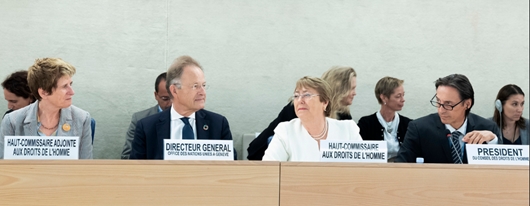
[UN Photo / Jean-Marc Ferré]
During the Thirty-Ninth Session the Council focused on the most serious and urgent human rights issues across the globe. The Council heard the presentation of 124 reports that addressed 40 various themes and 50 country-specific situations. The Council also heard from 25 independent human rights experts, working groups and investigative bodies; held three panel discussions and heard eight oral updates and statements by four high-level dignitaries; and adopted the outcomes of the Universal Periodic Review of 14 states. In all, representatives from 150 states, 303 non-governmental organisations, and 27 national human rights institutions (NHRIs) participated in the thirty-ninth session of the Human Rights Council.
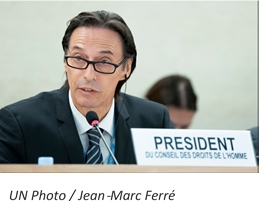 The President of the Council, Ambassador Vojislav Šuc of Slovenia, opened the thirty-ninth session and officially welcomed the new High Commissioner for Human Rights, Michelle Bachelet. He also welcomed the representatives of five least developed countries attending the Council with the help of the Council’s trust fund. He stressed that the Council has a zero-tolerance policy toward harassment and sexual harassment and also noted that, as President, he would follow up on all allegations concerning acts of intimidation or reprisals against civil society.
The President of the Council, Ambassador Vojislav Šuc of Slovenia, opened the thirty-ninth session and officially welcomed the new High Commissioner for Human Rights, Michelle Bachelet. He also welcomed the representatives of five least developed countries attending the Council with the help of the Council’s trust fund. He stressed that the Council has a zero-tolerance policy toward harassment and sexual harassment and also noted that, as President, he would follow up on all allegations concerning acts of intimidation or reprisals against civil society.
Opening Statement by the UN High Commissioner for Human Rights
Ms. Michelle Bachelet, the newly appointed UN High Commissioner for Human Rights (HCHR), officially assumed her post as High Commissioner on September 1 2018. In her first opening statement at the 39th Regular Session of the Human Rights Council she appreciated the work of her predecessor, Mr. Zeid Ra’ad Al Hussein, for his activism, humanity, courage, achievements, and for being the voice of the victims of human rights violations. She highlighted the importance of the 70th anniversary of the Universal Declaration of Human Rights. She also reminded the Council that the rights and needs of people are the central focus of the Council.
Ms. Bachelet introduced herself as a political detainee, the daughter of political detainees, and a refugee. As a physician she has attended to children who experienced torture and the enforced disappearances of their parents. She brings to the mandate of the High Commissioner her years of experience in the public service and her lifelong dedication to reverse hatred and ensuring respect and equality for all. She has headed the United Nations Entity for Gender Equality and the Empowerment of Women, has led Chile twice as its president, and remembered the coup d’état in Chile 45 years ago which brought brutality, torture and bloodshed to the country. Being a former President, she said that she would bring her experience in public service and lifelong dedication to ending hatred and ensuring equality to the mandate.
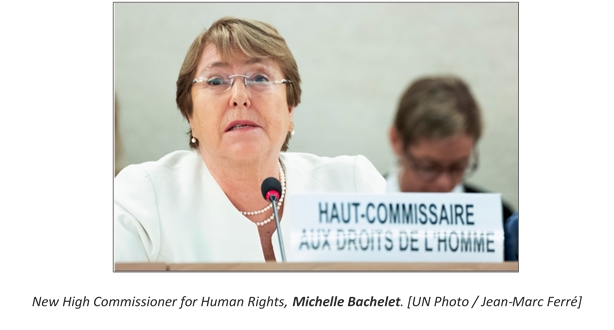
Ms. Bachelet asserted to the Council that human rights expresses the core purpose of the United Nations, thus we can only achieve peace, security, and sustainable development by advancing dignity and equality for all. She added that upholding human rights is in everyone’s interest although political differences may have divided some countries. She deeply admires the work of the Human Rights Council with its mechanisms and experts, the working of the Universal Periodic Review (UPR) and the enquiries made by the fact-finding missions of the Council. The undermining of multilateral institutions, such as this Council, by countries would only lead to failure of meeting the challenges that people face. Good governance is based on identifying and amending the gaps toward access to justice, dignity, and equality so we can live in more respectful and harmonious societies. She stressed upon the importance of consensus, cooperation, and collectiveness of member states at the Council rather than disputes, division, and withdrawals to sustain core principles and common goals.
Ms. Bachelet acknowledged that military leaders could end military intervention in democratic politics and work towards reconciliation with the victims of oppression. The presence of centuries of prejudice and discrimination against the people of the Global South and women could be pushed back. It is the states that hold the primary responsibility for upholding the rights of their people, and she affirmed that she would always listen to the governments. Furthermore, she added that the progress of the Sustainable Development Goals would not be possible without the discussion of human rights.
Ms. Bachelet affirmed that she would advocate for the civil, political, economic, social and cultural rights that were inherent entitlements of all people and said that she would strive to be their voice and their strong defender in complete objectivity, without fear or fervor, and to urge all States to protect and promote all human rights, without distinction. The council has the responsibility to speak out against every instance of human rights violations regardless of sex, gender identity, race or ethnicity, religion, disability, migration status or any other characteristics irrespective of the political regime in a given country. The Human Rights Council has the right to advocate and assist transformative improvements in upholding these rights, which extend from the digital universe to abject poverty. To this end, measures which enable the development of people should be adopted; including measures to promote access to the best quality education, health care and fundamental services.
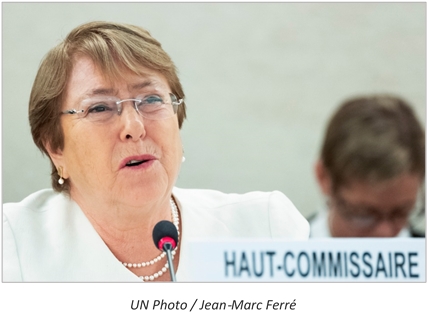
Ms. Bachelet noted that much work has already been accomplished by the Office of the High Commissioner and its 72 offices, the Human Rights Council and its mechanisms, and civil society activists. She further highlighted the importance of building better multilateralism, more strategic coordination, more dialogue and more justice for making rights a reality.
She touched on issues related to migration and other concerns in Nicaragua, Venezuela, United States, and countries of the European Union including Italy, Austria, and Germany. She also spoke about issues in Myanmar, Bangladesh, Cambodia, India, the region of Kashmir on both sides of the line of control, Afghanistan, the Democratic People’s Republic of Korea, China, Sri Lanka, Syria, Yemen, Saudi Arabia, Iraq, Bahrain, Iran, Egypt, the Occupied Palestinian Territory, Eritrea, Ethiopia, Mali, Cameroon, Sudan, South Sudan, Somalia, the Central African Republic, Burundi, the Democratic Republic of the Congo, Turkmenistan, Tajikistan, Russian Federation, Turkey, Ukraine, Colombia, Mexico, Guatemala, and Haiti.
In closing, the High Commissioner emphasized her concerns about the situation in Myanmar, Idlib in Syria, and Egypt. She appreciated the pretrial chamber of the ICC finding and that the court has jurisdiction over the alleged deportations of Rohingyas from Myanmar. This is an important step to end impunity and welcomed the efforts of Member States to establish an independent international mechanism for Myanmar. She urged the Council to pass a resolution and refer the matter to the General Assembly so that such a mechanism could be established. She further highlighted the impending crisis situations in Idlib in Syria and urged all the nations to take all the necessary steps to urgently ensure protection of the people.
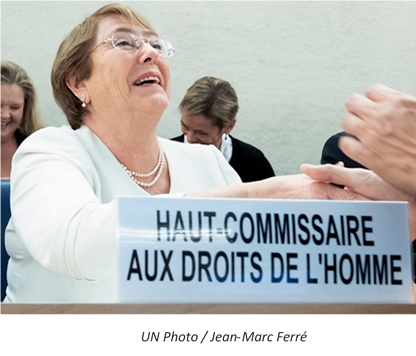
High-Level Panel on 70th Anniversary of the Convention on Prevention of Genocide
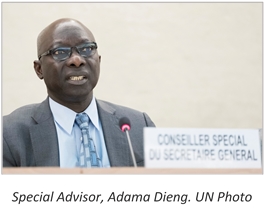 In a high-level panel discussion and interactive dialogue with the Special Adviser to the Secretary-General on the Prevention of Genocide, Adama Dieng, and other distinguished panellists, the Council commemorated the seventieth anniversary of the Convention on the Prevention and Punishment of the Crime of Genocide. During the interactive dialogue, the President of the Council Vojislav Šuc reaffirmed the significance of the Convention on Genocide and urged the international community to continue efforts to not only punish but also prevent the crime of genocide. High Commissioner for Human Rights Michelle Bachelet said that genocide remains a threat and reality in the 21st century. Impartial investigations, access to justice, and effective remedies for victims is needed for accountability. She also said that states hold the primary responsibility to prosecute perpetrators, along with international courts and bodies who can help punish, and thus help prevent crime of genocide.
In a high-level panel discussion and interactive dialogue with the Special Adviser to the Secretary-General on the Prevention of Genocide, Adama Dieng, and other distinguished panellists, the Council commemorated the seventieth anniversary of the Convention on the Prevention and Punishment of the Crime of Genocide. During the interactive dialogue, the President of the Council Vojislav Šuc reaffirmed the significance of the Convention on Genocide and urged the international community to continue efforts to not only punish but also prevent the crime of genocide. High Commissioner for Human Rights Michelle Bachelet said that genocide remains a threat and reality in the 21st century. Impartial investigations, access to justice, and effective remedies for victims is needed for accountability. She also said that states hold the primary responsibility to prosecute perpetrators, along with international courts and bodies who can help punish, and thus help prevent crime of genocide.
Kimberly Prost, Judge of the International Criminal Court, said that the sure way of preventing the crime of genocide is “to address the underlying issues, end the cycle of violence and replace vengeance by justice.” William Schabas, professor of international law at Middlesex University and professor of international criminal law and human rights at Leiden University, reminded the Council that Raphael Lemkin had a broader vision of genocide than the current wording in the Convention of Genocide but many UN members were unwilling to go that far due to the occurrence of genocide within their borders. He also, recalled that the Convention of Genocide came from the Global South and was a Cuban and Indian initiative. Fabion Salvioli, Special Rapporteur on the promotion of truth, justice, reparation and guarantees of non-recurrence acclaimed that this Human Rights Council is the appropriate forum to commemorate the 70th Anniversary of the Convention. The best way of commemorating the victims, he said, is to show solidarity with the past and current victims of the crime of genocide. The panellists noted that in too many instances the international community failed to prevent the most serious of atrocities. In light of this they called for more robust accountability mechanisms that foster structural policies and that focus on prevention.
At the end of the session, the Council adopted 23 resolutions and a Presidential statement (A/HRC/39/L.4) that addressed multiple themes including human rights situations in Burundi, Myanmar, Venezuela, and Yemen. Additionally, three vacancies of Special Procedures mandate holders were filled, four new members of the Council’s Advisory Committee were elected, and a report of the session was adopted.
Council Resolutions and Decisions
The Human Rights Council adopted 23 resolutions at the end of its 39th Session. The following issues and countries covered by GICJ were the subject of resolutions:
COUNTRIES
• Burundi (A/HRC/RES/39/14)
• Central African Republic (A/HRC/RES/39/19)
• Democratic Republic of the Congo (A/HRC/RES/39/20)
• Myanmar (A/HRC/RES/39/2)
• Syria (A/HRC/RES/39/15)
• Yemen (A/HRC/RES/39/16, A/HRC/RES/39/21)
ISSUES
• Indigenous peoples (A/HRC/RES/39/13)
• Water and sanitation (A/HRC/RES/39/8)
A summary of the resolutions and the debate accompanying their adoption can be found in the Appendix.
GICJ’s Participation at the Human Rights Council
Oral statements
Geneva International Centre for Justice (GICJ) delivered 20 joint oral statements with International Organization for the Elimination of All Forms of Racial Discrimination (EAFORD) and International-Lawyers.Org (INTLawyers) during the 39th Regular Session of the United Nations Human Rights Council. GICJ covered several thematic issues and specific country situations under various Agenda Items of the Human Rights Council, which included recommendations to the Council, member states, and other relevant bodies and stakeholders.
Agenda Items
• Item 2: Annual report of the United Nations High Commissioner for Human Rights and reports of the Office of the High Commissioner and the Secretary-General.
• Item 3: Promotion and protection of all human rights, civil, political, economic, social and cultural rights, including the right to development.
• Item 4: Human rights situations that require the Council’s attention.
• Item 5: Human rights bodies and mechanisms.
• Item 6: Universal periodic review.
• Item 7: Human rights situation in Palestine and other occupied Arab territories.
• Item 8: Follow-up to and implementation of the Vienna Declaration and Programme of Action.
• Item 9: Racism, racial discrimination, xenophobia and related forms of intolerance, follow-up to and implementation of the Durban Declaration and Programme of Action.
• Item 10: Technical assistance and capacity-building.
Thematic Issues
Annual Report of the High Commissioner
GICJ commented on several issues that were mentioned in the newly appointed High Commissioner’s Report under General Debate Item 2. These included the rights of women and children; civil, political, and economic rights; climate change; and racial discrimination.
General Debate
Item 2: Annual report of the United Nations High Commissioner for Human Rights and reports of the Office of the High Commissioner and the Secretary-General
Office of the High Commissioner and the Secretary-General
11 September 2018
Delivered by: Mr. Christopher Gawronski
Mr. President,
International-Lawyers.org welcomes the new High Commissioner for Human Rights Dr. Michelle Bachelet and her opening statement.
We especially welcome the High Commissioner’s focus on the rights of women and children to health care and to development. We note that these rights, together with other social and economic rights have been increasingly marginalized by the Council. We hope that the High Commissioner, as a former head of State, will be able to encourage the Council’s Member States to provide equal attention and resources to the protection of both civil and political as well as economic and social rights. Indeed, the right to development brings both these groups of human rights together requiring States to cooperate for, and to ensure within their own borders, equity and equality in the exploitation and use of the resources of this planet.
We also note the references to climate change and human rights. To date there has been a notable lack of dedicated climate change expertise in the Office of the High Commissioner. We continue to advocate for a dedicated Human Rights Council mandate on climate change and human rights, for which a conditio sina qua non is the establishment of greater expert capacity in the OHCHR.
Finally, we hope that the High Commissioner will also prioritize non-discrimination, and the dissemination and implementation of the Durban Declaration and Programme of Action against racism and other insidious forms of discrimination. Action on this global agenda has not only been slow, but sometimes has been sacrificed for other priorities appearing to have been decided not by the Member States. The UN itself must be the flag bearer of human rights and the priorities that the international community has acknowledged in legally-binding treaties and other aspirational pronouncements. Your record as not only a head of State, but perhaps more importantly as human rights defender, is evidence that you can ensure this result.
Thank you.
Civil Society Space
GICJ jointly with EAFORD addressed the United Nations budget cuts and the shrinking civil society space at the UN under General Debate Item 5. Also, noting that over the years there has been much concern that civil society space at the UN Human Rights Council has continued to diminish due to a number of factors and actions taken, jointly delivered a statement under General Debate Item 8.
General Debate
Item 5: Human rights bodies and mechanisms
21 September 2018
Delivered by: Mr. Mutua K. Kobia
Mr. President,
Earlier this year, a major decision was taken by UN member states to heavily cut the budget of the UN. EAFORD and Geneva International Centre for Justice would like to express our deep concern with this decision as it adversely affects the functioning of the Human Rights Council, its human rights bodies and mechanisms, and in turn humanitarian and climate disasters, and the most vulnerable who deserve this Council’s attention.
It is deeply worrying that this decision was taken after it was well acknowledging that the total workload of this Council more than doubled and is likely to increase considering the current and projected state of human rights situations across the globe. Such budget cuts, with reduced allocated time equate to less efficiency, less data, and a reduction of expertise.
Mr. President, how are we expected to promote and protect human rights with a reduced budget and increased work load?
We are also very much concerned that these cuts will reduce civil society space in the Human Rights Council by way of indirect factors that may not be realised until it is too late.
On this issue, we note that while this Council’s President has continuously warned against acts of intimidation, personal attacks, and other behaviour of that nature, we regrettably inform that most recently there have been such incidents by members of this Council against representatives of non-governmental organisations. It is also with deep regret to note that there appears to be a selective attitude in addressing reprisals against NGOs.
In conclusion, we reiterate the words of Danish lawyer Morten Kjaerum, “The civil society organisations are the eyes, the ears and the voice for protecting and promoting human rights. The importance of NGOs can therefore not be overstated.”
Thank you.
General Debate
Item 8: Follow-up to and implementation of the Vienna Declaration and Programme of Action
25 September 2018
Delivered by: Ms. Chiraz Khemakhem
Mr. President,
In the VDPA, under section C on “Cooperation, development and strengthening of human rights”, paragraph 67 gives special emphasis towards strengthening of a pluralistic civil society. However, we note the shrinking civil society space at Human Rights Council and the United Nations as a whole. For instance, non-governmental organizations at the Human Rights Council used to have an unlimited number of invitations for interested persons outside the UN to attend a side-event, however, this number was limited to fifteen persons in the previous sessions, and worse still has been further limited to only five persons as from this session.
Furthermore, the process of accreditation is not convenient enough for people with limited internet access or computer skills, which is time consuming, and will be further discouraged from attending the Council for only a couple of hours.
These actions will ultimately limit civil society’s desire to physically participate, contribute their expertise and best practices and inform their lived experiences to this Council about the grave and serious human rights situations that are discussed by this Human Rights Council and does not encourage anyone from outside the UN to attend the sessions and informal meetings and moreover, does not strengthen civil society space at the Human Rights Council.
Mr. President, EAFORD and Geneva International Centre for Justice call upon this Council to put more emphasize on VDPA aspects so that civil societies and non-governmental organization work in reporting and preventing human rights violations are better implemented.
Thank you.
Contemporary Forms of Slavery
Under Agenda Item 3 an Interactive Dialogue with the Special Rapporteur on Contemporary Forms of Slavery was held. During this Interactive Dialogue, GICJ jointly with INTLawyers addressed the links between the dire situation of domestic migrant workers and private employment agencies.
Interactive Dialogue with Special Rapporteur on Contemporary Forms of Slavery
Item 3: Promotion and protection of all human rights, civil, political, economic, social and cultural rights, including the right to development
10 September 2018
Delivered by: Mr. Christopher Gawronski
Mr. President,
We welcome the report of the Special Rapporteur on contemporary forms of slavery, including its causes and consequences, which focuses on migrant domestic workers and strongly addresses women migrants.
It is with deep regret that we note that domestic migrant workers, and especially women domestic workers in slavery-like conditions, face further restrictions and lose certain freedoms as a direct result of experiencing discriminatory practices and human rights abuses such as sexual violence.
Mr. President,
Private employment agencies, only briefly mentioned in the report, play a major role with regards to human rights abuses of domestic workers, a role which could and should be reversed towards protecting human rights of domestic workers. The larger business community both domestic and international has a significant role to play in discouraging bad actors and promoting human rights of migrant domestic workers.
In addition to implementing protection measures, as has been previously mentioned it is as crucial to address the root causes of push factors that compel millions to seek domestic work, such as extreme poverty and lack of opportunities especially for women and girls in countries of origin.
To this end, International-Lawyers.Org and Geneva International Centre for Justice ask the Special Rapporteur whether bi-lateral agreements regarding migrant workers, such as the one between Saudi Arabia and the Philippines in 2013, are effective? If so, how can member states be encouraged to sign similar bilateral agreements concerning foreign domestic workers?
In conclusion, we recommend member states to do the following:
• First, implement a strategy focused on enhancing human rights training of local and national authorities qualifying them to create more responsive reporting channels to file human rights complaints and to provide access to justice for migrant domestic workers regardless of their migration status;
• Second, ensure, with the help of NGOs and CSOs, that information concerning access to justice and remedies for foreign domestic workers is translated into appropriate languages; and
• Finally, implement an adequate special prosecution unit for all perpetrators of human rights abuses against domestic workers.
Thank you.
[Response by Special Rapporteur Ms. Urmila Bhoola.]
Peasants
Food sovereignty and legal obligations were addressed in regard to the Rights of Peasants. Certain aspects within the Declaration on the Rights of Peasants were also mentioned under the General Debate including the Inter-Governmental Working Group of Peasants of Item 5.
General Debate on Intergovernmental Working Group on Rights of Peasants
Item 5: Human rights bodies and mechanisms
21 September 2018
Delivered by: Mr. Christopher Gawronski
Mr. President,
We welcome the progress being made on the Declaration on the Rights of Peasants and other people working in rural areas. We note the important role declarations play in the development of international law. The Human Rights Council itself may not have existed without the adoption of aspirational texts by the General Assembly in 1948 and the World Conference on Human Rights in 1993 calling for the development of international human rights law.
We very much welcome the experts’ suggestion, supported by numerous States, of including food sovereignty and the term “Mother Earth” in the Declaration. The importance of having a voice in shaping one’s own food supply and agricultural system is critical in many ways, especially for those in rural areas who play the most critical role in our food production. We regret the views of States that seek to dilute existing legal obligations by changing them into non-obligatory language in the Declaration. This Declaration must not distract from existing legal obligations but must build on them to address the vulnerabilities, and support the human rights, of peasants and other people working in rural areas.
Mr. President,
International-Lawyers.Org and Geneva International Centre for Justice hope the Working Group will adopt the strong and well-motivated positions endorsed by the experts in constructing a Declaration that is an important step in ensuring the rights of peasants and other people working in rural areas.
Thank you.
Privacy in the Digital Age
The Right to Privacy in the Digital Age is a rising issue that was addressed by the new High Commissioner. In light of this GICJ, EAFORD, and Homo Digitalis addressed the topic of protection under General Debate Item 2.
General Debate
Item 2: Annual report of the United Nations High Commissioner for Human Rights and reports of the Office of the High Commissioner and the Secretary-General
11 September 2018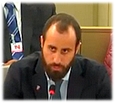
Delivered by: Mr. Konstantinos Kakavoulis
Mr. President,
We would like to thank the High Commissioner for her oral update and her overall efforts throughout all these years for the protection of human rights in a constantly changing world.
We wish her all the best in his future endeavours.
EAFORD, Geneva International Centre for Justice and Homo Digitalis would like to focus particularly in the High Commissioner’s Report on the Right to Privacy in the Digital Age.
The Internet reforms our society as a whole, but also the human existence in itself, by creating a new, digital representation of ourselves; a digital personality, which is not necessarily identical to our real personality, but enjoys the same freedoms and rights.
To this end, the High Commissioner’s Report is more acute than ever.
We wish to underline that ensuring the protection of individuals against unlawful or arbitrary interference from surveillance measures requires that effective national legal frameworks are in place.
However, in many jurisdictions, national legislation is non-existent, ambiguous or outdated.
Even under the EU General Data Protection Regulation, a milestone in the protection of the right to privacy in the digital age, governments still have ample scope to claim that national security justifies attacks on privacy.
We urge all States, civil society and stakeholders to work towards giving individuals knowledge and tools necessary to look after themselves; this might prove to be the most effective response to an uneven –and sometimes contradictory legal landscape.
We should always remember that the only non-legal instrument that is powerful enough to provoke change is human conscience.
Thank you.
Racism and Racial Discrimination
GICJ jointly with INTLawyers addressed the divisive nature racism and xenophobia has on communities and societies especially when stirred up by the leaders of countries under General Debate Item 9. Under the same Agenda Item, GICJ and EAFORD also addressed racism and racial discrimination in a historical context and noted how political parties and persons in positions of power use hatred to instil fear for their own objectives.
General Debate
Item 9: Racism, racial discrimination, xenophobia and related forms of intolerance, follow-up to and implementation of the Durban Declaration and Programme of Action
25 September 2018
Delivered by: Mr. Christopher Gawronski
Mr. Vice President,
We welcome the continued presence of the issue of racism and discrimination as an item on the agenda of the Human Rights Council. The international attention given to this issue resulted in the welcome development of the Durban Declaration and Programme of Action.
Unfortunately, after significant international progress, the prevalence of overt racism is on the rise around the world. The flames of racism and xenophobia are being fanned by leaders in countries and cultures across the globe, using the unprecedented ability of modern communications to rapidly spread messages of hate. A trend toward closing borders and blaming migrants and racial minorities for crimes and other social ills seems to be accelerating. Urgent action is needed.
Racism and discrimination, especially when enshrined in law, ultimately only serve to divide communities, and societies, and humanity against itself. No one wins when we create a concept of “others” that makes “them” less than human. The creative potential of our human family is enriched by our diversity – and attitudes and actions that seek to discourage or destroy that diversity threaten the very core of what makes us human.
Mr. Vice President,
International-Lawyers.Org and Geneva International Centre for Justice request all members of this Council to adopt the DDPA, and more importantly to implement the DDPA. We now have a global society. Only by actively working against parochial, racist attitudes can we hope to have a positive future on this planet we all share.
Thank you.
General Debate
Item 9: Racism, racial discrimination, xenophobia and related forms of intolerance, follow-up to and implementation of the Durban Declaration and Programme of Action
25 September 2018
Delivered by: Mr. Mutua K. Kobia
Mr. President,
We are deeply concerned that while racism, racial discrimination, xenophobia, and related forms of intolerance continues to be alive and on the rise in nearly all regions of the globe the issue remains taboo or is not taken seriously enough. Moreover, it has led to the creation of discriminatory laws and are often the root causes of social and economic inequalities, and violent conflicts that have devastated the lives of individuals and communities. In a historical context, some of the worst and most unimaginable atrocities and crimes against humanity such as torture, slavery, ethnic cleansing, and even genocide are attributed to the evil of racism.
Today, political parties and persons in positions of power continue to spread disinformation, misinformation, inaccurate portrayals of migrants and people with different ethnic backgrounds, information based on false accounts, and hate speech with the intended result of instilling fear of vulnerable groups and minorities among their populations. This form of manipulation allows them to win and govern a country based on fear and hatred and with the strong possibility of enacting discriminatory and racist laws.
Mr. President,
All this considered, why does it not appear to be a serious subject with a high priority in the UN?
To this end, EAFORD and Geneva International Centre for Justice, urge all member states to:
• Seriously address the issue of global racism, its root causes and implications;
• Enhance disaggregated data collection on race-related crimes;
• And finally, we strongly recommend states to support, adopt and fully implement the Durban Declaration and Programme of Action.
Water and Sanitation
Interactive Dialogue with the Special Rapporteur on Safe Drinking Water and Sanitation
Item:3 Promotion and protection of all human rights, civil, political, economic, social and cultural rights, including the right to development Delivered
10 September 2018
Delivered by: Mr. Mutua K. Kobia
Thank you, Mr. President,
We thank the Special Rapporteur on the human right to safe drinking water and sanitation for his report which focuses on forcibly displaced persons and also addresses emergency situations, challenges and obstacles, and building resilience. Too often, the human right to safe drinking water is forgotten during and after emergency situations, which then leads to sanitation-related diseases, malnutrition, and other ailments that raise the death toll and increases health risks among populations. In this regard, the human rights to water and sanitation can provide guidance to prevent such dangers.
While welcoming the new High Commissioner for Human Rights, Ms. Michelle Bachelet, we thank her for acknowledging the situation in Iraq in her opening statement. In Basra, recent demonstrations resulted from the deteriorating availability and quality of water due to the ongoing emergency situation in Iraq and also governmental corruption. This concern brings attention to the aftermath of the invasion, occupation, and military campaigns in Iraq, which destroyed water purifying systems and other infrastructure, and the situation has worsened by cutting flows of water from neighbouring countries. This has left a large proportion of the Iraqi population without access to safe drinking water and sanitation.
Mr. President,
It is explicitly mentioned in the Special Rapporteur’s Report that “lack of clear allocation of responsibilities and lack of leadership by states are often identified as obstacle.” The lack of leadership within Iraq, often resulting from corruption, demonstrates the need to seriously address the issue of corruption in order to satisfy the human rights obligation to provide safe drinking water and sanitation in emergency situations.
To this end, EAFORD and Geneva International Centre for Justice call on this Council to devote efforts towards the human right to water in Iraq. We thank the Special Rapporteur for his work and strongly recommend and appreciate a focus on the situation in Iraq in his next mandate.
Thank you.
Countries
Democratic Republic of Congo (DRC)
GICJ and EAFORD jointly raised security concerns leading up to, during, and after the DRC December 2018 elections during an Interactive Dialogue on human rights in DRC under Agenda Item 10.
Enhanced Interactive Dialogue on the OHCHR Report on the Democratic Republic of Congo
Item 10: Technical assistance and capacity-building
25 September 2018
Delivered by: Mr. Mutua K. Kobia
Mr. President,
We welcome the annual report by the Office of the High Commissioner for Human Rights on the human rights situation and the activities of the UN Joint Human Rights Office in the Democratic Republic of Congo. In particular, we acknowledge the developments highlighted in the report concerning the December 2018 elections.
We also note that the violence perpetrated in the DRC is often a direct response to political clashes and government repression. In actuality, political elections and the process by which former presidents have taken power have always been undemocratic and preceded and followed by violence and other human rights violations. For example, threats and illegal detention of opposition leaders and activists, incidents of trafficking, and other serious human rights violations. These actions severely hinder any chance of fair, democratic, and transparent elections and further limits civil society space. Furthermore, they only add to DRC’s humanitarian situation which has become one of the most expensive and long-lasting humanitarian crises.
It is for the benefit of the DRC population and for the international community to remedy this situation also considering that more than eight countries are involved in DRC’s politics and the formation of several armed forces has further hindered the possibility of a democratic, unified and independent state.
Mr. President,
Regarding technical assistance and capacity-building, EAFORD and Geneva International Centre for Justice recommend human rights training for security officials and especially that of riot police for the protection of peaceful assembly and association leading up to, during, and after the 2018 December elections. Additionally, all necessary assistance for all those charged with overseeing the December 2018 elections must be ensured and election funds must be monitored.
Thank you.
Iraq
The humanitarian crisis and numerous human rights violations in Iraq as a result of the illegal war was brought to attention under General Debate Item 3, especially the dire situation in Iraqi prisons and detention centres. Additionally, under General Debate Item 4 GICJ and INTLawyers emphasized that this Council’s silence on human rights violations aside those committed by ISIS in Iraq has exacerbated the situation; furthermore, the education and health systems are demolished. To make matters worse the country’s wealth is being illegally transferred elsewhere. Also, under the General Debate of Item 4 GICJ and EAFORD brought to this Council’s attention the deprivation of basic civil, political, economic, and social rights toward the Iraqi people by the Iraq government; freedom of expression and association in Iraq was also addressed.
General Debate
Item 3: Promotion and protection of all human rights, civil, political, economic, social and cultural rights, including the right to development
17 September 2018
Delivered by: Christopher Gawronski
Mr. President,
International-Lawyers.Org and Geneva International Centre for Justice wish to alert the Council to the human rights situation in Iraq. Fifteen years after being the site and victim of an illegal war,
there have been no genuine discussions of Iraq in this Human Rights Council.
Iraq is now host to massive, grave and systematic human rights violations so numerous and varied that they cover the full mandate of this Council. From violations of civil and political rights, for example, the killing of protesters and control of the press, to economic, social and cultural rights, such as lack of clean water, sanitation, adequate food, education, health care and medicine – the list is unfortunately long indeed.
In particular, we want to stress the abhorrent situation of detention and prisons in Iraq. Yearly, governmental forces and militias in Iraq arbitrarily arrest and detain innocent civilians, and torture and kill many of those in detention and prison. Right now, hundreds of thousands are arbitrarily detained or imprisoned across the country. As a result, the prisons are severely overcrowded. The most urgent situation is the Al Hout prison in Al Nasirya. This prison hosts a number of former high-ranking government officials, many of whom are now advancing in age. They are regularly subjected to such ill treatment that several have died in custody. They are denied visits from family members and the ability to receive needed medicines.
Due to the dire nature of the situation in Iraq, we strongly urge this Council to take quick action. We realize that politics may be a strong deterrent to action by the Council, but it is incumbent upon the international community to address a situation that was initially created by foreign intervention.
Thank you.
General Debate
Item 4: Human rights situations that require the Council’s attention
18 September 2018
Delivered by: Ms. Chiraz Khemakhem
Mr. President,
EAFORD and Geneva International Centre for Justice would first like to draw the council’s attention to the human rights situation in Iraq. The Iraqi population are deprived from all basic civil, political, economic and social rights.
The most recent issue is what has been mentioned by the High Commissioner in her opening statement, namely, the situation in Basra where demonstrators took the street in protest over water shortages and water pollution. The response of the government has been particularly violent as they used intimidation tactics including direct police shootings of protestors. This complete disregard for freedom of expression and association resulted in the death and/or injury of more than 300 persons, as well as, the arrest of hundreds of protestors.
Another appalling issue is the wide use of the death penalty by the government. With one of the highest number of executions, Iraq holds today the third position in the world in terms of capital punishment cases. Those who are sentenced are mostly political opponents, civil society activists, and innocent people. The Iraqi government is abusing a broad anti-terrorism law to arbitrarily arrest, detain and justify its continuous and growing number of executions.
The situation of prisoners in detention centers also needs to be addressed here. Thousands of innocent Iraqis have been arbitrarily arrested to be later put in prisons or in secret detention centers without any fair trial proceedings.
Mr. President, the Iraqi people are appealing to this Council to put an end to their sufferings.
Thank you.
General Debate
Item 4: Human rights situations that require the Council’s attention
18 September 2018
Delivered by: Mr. Naji Haraj (Executive Director of GICJ)
[Joint statement by International-Lawyers.org and GICJ]
Mr. President,
Since the Council is currently discussing human rights issues that require the attention of the Council, the situation in Iraq, where grave human violations continue, requires serious and comprehensive discussion.
In the past, specific cases of human rights abuses have been briefly discussed, including ISIS atrocities, while other violations have been left behind. The silence of this Council, Mr. President, has exacerbated the situation, contributing to the current total failure of the state to provide basic services to the citizens.
As a result, we call your attention to arbitrary arrests, mass executions, and torture in prisons for thousands of detainees who were arrested under a terrorism pretext in the absence of an independent judiciary. The education system in Iraq has collapsed, the health system has been destroyed, and electricity is almost non-existent in most parts of the country. The situation is now such that the Iraqi citizen is reduced to protesting for a single drop of safe drinking water, although Iraq is one of the richest countries in the region.
Mr. President,
The United Nations and many States in this Hall are directly responsible for the slow deaths of thousands of Iraqis. The people of Iraq are deprived of all basic rights because the country's wealth is illegally transferred to several countries that are here with us. It is necessary to take actions to freeze all these assets. They belong to the people of Iraq and not to the gangs that are taking them away. Impunity must be ended; all violators must be brought to international justice.
Mr. President, these are the demands of millions of citizens of Iraq that I most sincerely convey to you.
Thank you.
Palestine
During the Interactive Dialogue with the Commission of Inquiry on Occupied Palestinian Territory (OPT) GICJ and INTLawyers underlined the responsibilities of an Occupying Power under international law in regard to the protection of human rights and noted that despite these principles in place, Israel, the Occupying Power, continues to violate the most basic of rights. As a result, victims and the oppressed attempt to raise their concerns in protest but are also denied this freedom. Under General Debate Item 7, GICJ and EAFORD brought to the Council’s attention the recent demolition of the village Khan al Ahmar. In the past 70 years the UN has passed numerous resolutions regarding Palestinian rights in the Occupied Arab Territories yet illegal settlements and other violations by the Occupying Power persist. Under the same agenda item GICJ and INTLawyers also highlighted other violations of basic human rights against Palestinians by the Occupying Power, Israel, and noted that these actions are clear breaches of international laws that further exacerbates other violations.
Interactive Dialogue on Commission of Inquiry on Occupied Palestinian Territory
Item 7: Human rights situation in Palestine and other occupied Arab territories
24 September 2018
Delivered by: Christopher Gawronski
Mr. President,
We welcome the update of the Commission on Inquiry and note with pleasure the Commission’s statement that accountability for human rights abuses is critical. Unfortunately, we continue to observe the severe position taken by Israel toward the rights of Palestinian civilians, and the actions taken by Israel as a result of its occupation of Palestinian territory.
International law establishes a number of clear responsibilities for an occupying power following an armed conflict. Israel’s half-century of occupation, has resulted in repeated violations of the Palestinian population’s rights, including rights to work, health, adequate standard of living and freedom of movement. With such consistent and recurring violations resulting in the deteriorated living standards and conditions of Palestinians, it is no surprise that people subjected to such conditions protest. As has been noted by others, the protest and related events that are the subject of your mandate have occurred within a larger context, including that of the ongoing occupation.
Mr. President,
International-Lawyers.Org and Geneva International Centre for Justice would like to request the Commission to particularly examine the links between the March protest and the ongoing occupation and isolation of Palestinian territory. We believe that any inquiry into specific events of this sort cannot produce results if they are not properly situated within the larger situation. We request all states to provide any necessary assistance to the Commission in the conduct of its important work.
Thank you.
General Debate
Item 7: Human rights situation in Palestine and other occupied Arab territories
24 September 2018
Delivered by: Ms. Chiraz Khemakhem
Mr. President,
Palestinians have paid an incredibly heavy price due to Israel’s ongoing occupation and racist policies instilled against them only because they are Palestinians.
Despite all resolutions taken by the UN bodies over the 70 past years regarding the Palestinians rights; Israel continues to expand its illegal settlements and besieges Gaza Strip and deals with Palestinians living under its jurisdiction as third-class citizens.
A particular attention should be given to the recent intent of demolition of the village Khan al Ahmar that will result in the forced relocation of its 188 citizens, half of them being children. These violations are considered to be war crimes under international law. The Palestinian lands are already fragmented and by destroying small Palestinian areas like this village, the northern West Bank will be cut off from its southern part.
The Israeli demolitions policy have already started in other villages like Al Walaja. This will further the illegal expansion of Israeli over the detriment of Palestinian people.
Mr. President,
EAFORD and Geneva International Centre for Justice call on this Council to put an end to all these violations, we call upon concerned bodies to put an end to the Israeli occupation to Palestine.
Thank you.
General Debate
Item 7: Human rights situation in Palestine and other occupied Arab territories
24 September 2018
Delivered by: Christopher Gawronski
Mr. President,
The humanitarian situation of the Palestinian territory continues to deteriorate and fails to receive necessary action by the international community. We support all efforts to address the humanitarian situation and encourage all states to dedicate resources to improve the daily situation of Palestinians. However, we believe that there can be no resolution to the Israeli-Palestinian conflict without an end to the occupation of Palestinian territory by Israel.
During its half-century of belligerent occupation, Israel has repeatedly violated clear rules of international law through its illegal settlements, wall-building, and forced relocations of the population. The rights of the Palestinian population to work, health, adequate standard of living and freedom of movement have been violated as a result.
In addition, the gradual and insidious taking of land, including private land, from Palestinians, in clear violation of international law, exacerbates the other violations by diminishing the resources of Palestinian communities and squeezing the population onto an ever-shrinking amount of land. The International Court of Justice, in its advisory opinion on the wall constructed by Israel, opined that all states are under an obligation not to recognize or assist in the illegal situation resulting from construction of the wall.
Mr. President,
International-Lawyers.Org and Geneva International Centre for Justice believe that by ending the occupation, a peaceful solution may be possible. As we have done consistently, we call for an end to the belligerent occupation of Palestinian territory and request all states to apply their efforts toward this end.
Thank you.
South Sudan
During the Interactive Dialogue with the Commission of human rights in South Sudan, GICJ and EAFORD acknowledged major developments in South Sudan. They also raised the issue of attacks against aid workers and the issue of child soldiers as a result of the violent crisis and brought to attention the matter of statelessness in South Sudan.
Interactive Dialogue with the Commission of Human Rights in South Sudan
Item 4: Human rights situations that require the Council’s attention
17 September 2018
Delivered by: Mr. Mutua K. Kobia
Mr. President,
EAFORD and Geneva International Centre for Justice acknowledge the recent developments in South Sudan but remain concerned over persisting serious human rights issues. For the third straight year, South Sudan tops the global list of violence against humanitarian operations making it the most dangerous country for aid workers. The “Aid Worker Security Report, 2018” recorded major attacks against aid workers where South Sudan accounted for almost one third of the 158 major violent incidents against aid workers that included killings by gunfire and aid worker kidnappings.
While we also acknowledge the release of over 900 child soldiers, including girls, in 2018 alone from the ranks of Armed Groups in South Sudan, and with additional releases expected, the numerous documented and reported incidents unveil horrible violent attacks that killed and maimed hundreds of children and cases of sexual violence against girls. Such incidents must be adequately addressed where perpetrators are held to account and victims receive due justice.
Concerning statelessness, administrative challenges and continuous poverty have created additional problems thus increasing risk of statelessness that can lead to loss of access to basic human rights and services such as education and other political, economic, and social deprivations and payment of higher taxes.
Regrettably, South Sudan is currently not party to the 1954 Convention Relating to the Status of Stateless Persons nor the 1961 Convention on the Reduction of Statelessness, and additionally, the 2011 Nationality Act does not address or determine statelessness procedures in South Sudan.
To the Commission on human rights in South Sudan we would like to ask, how is the Commission addressing the various challenges of statelessness in South Sudan and what steps are being taken to ensure the safety of aid workers and the safe reintegration of child soldiers into society?
Thank you.
Yemen
Toward ending the civil war, realizing peace efforts, and for the full promotion and protection of human rights in Yemen, GICJ and EAFORD stressed the importance of addressing the root causes of the Yemeni Civil War during the General Debate under Agenda Item 3. With regard to technical assistance and capacity-building during the General Debate under Agenda Item 10, GICJ and INTLawyers called on all parties to the conflict to facilitate the entry and distribution of necessary aid and to support the legitimate government of Yemen in order to end the conflict. Under the same General Debate Item GICJ jointly with EAFORD also called for technical assistance and capacity-building toward implementation of the UN Security Council resolutions on Yemen and ending diplomatic and military support of the backers of the Houthi militia, which would facilitate peace talks and ending the violent conflict.
General Debate
Item 3: Promotion and protection of all human rights, civil, political, economic, social and cultural rights, including the right to development
14 September 2018
Delivered by: Mr. Mutua K. Kobia
Mr. President,
For the full promotion and protection of human rights amidst conflict situations it is without a doubt that root causes must be sufficiently addressed and tackled.
In the 2018 annual report of the Special Rapporteur on the right to development, A/HRC/39/51, under ‘Identifying those left behind’ the SR correctly notes that a crucial inquiry is to identify, acknowledge, and address the root causes of inequality and discrimination. However, this has not been the case in numerous serious human rights crisis situations where root causes, including that of inequalities and various discrimination, have not been adequately addressed. The crisis in Yemen is an example of this occurrence.
While we commend the efforts of the UN and the international community for supporting peace efforts in Yemen they have, unfortunately only resulted in short-term solutions. The issue of power transfer since 2011 and control of northern Yemen by the Houthis deserves more attention and investigation in relation to the current conflict.
The danger of not addressing root causes is the inevitable possibility of repeated, similar, and/or related crimes; furthermore, perpetrators are further given the chance to escape justice and enjoy opportunity and worse yet many more innocent civilians will suffer atrocities that could have been avoided.
EAFORD and Geneva International Centre for Justice recommend and strongly urge this Human Rights Council to call on its relevant special procedures and stakeholders, and the Security Council to push for dialogue that identifies, acknowledges, and addresses the root causes of the Yemeni conflict.
Thank you.
General Debate
Item 10: Technical assistance and capacity-building
27 September 2018
Delivered by: Mr. Mutua K. Kobia
Mr. President,
Millions of people in Yemen are victims of atrocities such as arbitrary deprivation of liberty, torture, unlawful detention and killing, enforced disappearances, blockades, intimidation, etc. As the Security Council established resolutions for peace in Yemen, the UN must address this conflict effectively by investigating and recognizing the main root causes of the actual situation and by encouraging and supporting the National Dialogue. The international community must also take actions against all parties that are supporting the Houthis with the supply of arms and weapons.
To this end, capacity-building must be strengthened with regard to fully implementing the UN Security Council resolutions, which clearly lay out solutions toward ending the conflict and starting a political process. This would indeed help in ending the war and the long-standing humanitarian crisis.
Mr, President,
EAFORD and Geneva International Centre for Justice urge this Council to provide the Yemeni government with the necessary technical assistance and capacity-building toward facilitating peace talks and ending diplomatic and military support of the backers of the Houthi militia.
Thank you.
General Debate
Item 10: Technical assistance and capacity-building
27 September 2018
Delivered by: Mr. Christopher Miller
Mr. President,
As was repeatedly mentioned yesterday, Yemen is facing an unprecedented humanitarian crisis, and is in desperate need of technical and humanitarian assistance from the international community. We call on all parties to the conflict to facilitate the entry and distribution of food, medicines, and other humanitarian assistance to the millions of Yemeni civilians in desperate need.
However, the humanitarian crisis will not end solely by providing aid to civilians. The UN and international community must work to end the conflict that has given rise to the crisis by providing any necessary technical assistance requested by the Yemeni government.
We remind this Council of the resolutions of the Security Council, which have demanded an end to the fighting and outlawed the arming of the Houthis and other destabilizing militia groups. All states need to support the legitimate government of Yemen in its efforts to craft a peaceful, political resolution and build the capacity of its national institutions.
Mr. President,
International-Lawyers.Org and Geneva International Centre for Justice applaud the continuing peace-making efforts of the UN Special Envoy for Yemen, and we urge the High Commissioner for Human Rights and other UN agencies to coordinate their activities and avoid sending mixed messages. An unfortunate example of this is the report of the Group of Experts, which the Houthi militia interpreted as providing justification for its cause and encouraged it to refuse to participate in the recent Geneva peace talks.
The UN must have a consistent approach that is aligned with Security Council resolutions and supportive of the Special Envoy’s peace efforts – because ending the conflict is the only lasting solution for Yemeni civilians.
Written statements
A Look into Modern Day Slavery
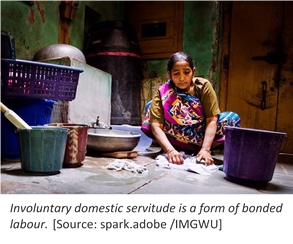 Countries have implemented numerous laws to prohibit any forms of slavery practices, however, new forms of contemporary slavery have appeared and countries have failed to prevent them. Besides traditional slavery, the mandate of the Special Rapporteur on contemporary forms of slavery, including its causes and consequences includes “forced labour, debt bondage, serfdom, children working in slavery or slavery-like conditions, domestic servitude, sexual slavery, and servile forms of marriage.”
Countries have implemented numerous laws to prohibit any forms of slavery practices, however, new forms of contemporary slavery have appeared and countries have failed to prevent them. Besides traditional slavery, the mandate of the Special Rapporteur on contemporary forms of slavery, including its causes and consequences includes “forced labour, debt bondage, serfdom, children working in slavery or slavery-like conditions, domestic servitude, sexual slavery, and servile forms of marriage.”
On 17 July 2017, the United Nations General Assembly published a report addressing the Contemporary forms of slavery, including its causes and consequences by tackling inequalities, gender differences, equal economic opportunities that would enable the world to reach the 2030 Agenda for Sustainable Development. Poverty, even though reduced still plays a major role in increasing slavery practices since most slavery targets are those part of the most vulnerable groups such as child pornography or child prostitution. Among the recommendations GICJ:
- Called on the international community to boycott campaigns against products made by enslaved persons and in particular those produced by children;
- Called on the Human Rights Council to enhance their collaboration with countries of origin to help create safer transit routes for migrants and develop mechanisms to ensure adequate safety,
- Called on member states to strengthen the security with regards to human trafficking both on the borders and in detention centres as well as developing bilateral agreements with the countries of origin; Implement economic reforms relating to working conditions, prohibiting any forms of exploitation in the workplace (working hours, minimum age, matching international standards as for the safety and health in the workplace and recruitment) with the focus on child labour and slavery, ensuring transparency in the business environment (including the whole supply chains).
Link to full written statement.
Aid Workers, Children in Armed Conflict, and Statelessness in South Sudan
The civil war in South Sudan that began in December 2013 has claimed the lives of about 10,000 people and has displaced millions of others. For the third straight year South Sudan tops the global list of violence against humanitarian operations making it the most dangerous country for aid workers. The “Aid Worker Security Report, 2018” recorded major attacks against aid workers where South Sudan accounted for almost one third of the 158 major violent incidents against aid workers.
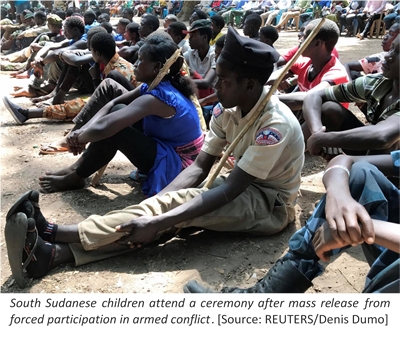
Since the beginning of the civil war in 2015 over 19,000 children were recruited and used by both warring parties and other government security forces and armed groups further endangering them and exposing them to high risks of being killed and maimed in the conflict between SPLA and SPLA-IO. Numerous incidents have been documented and reported of horrible violent attacks that killed and maimed hundreds of children and cases of sexual violence against girls are also on record.
As well, the repercussions of statelessness in South Sudan can truly affect a person’s life as their status will lead to the loss of access to basic rights and services such as education.
This statement addresses violent attacks against aid workers in South Sudan, the situation of children in armed conflict, and statelessness. These grave matters, among others, must be actively addressed especially for the sake of victims and people of South Sudan as they continue to struggle for peace and justice. To this end, GICJ gave recommendations, which included:
- The Human Rights Council to urge the international community and all relevant UN bodies to reinforce and enhance security measures towards humanitarian aid operations in South Sudan, especially the most vulnerable and remote areas;
- The government of South Sudan to release all remaining child soldiers from Army Ranks and prioritize special health and education concerns of those released; and
- The International Community to guarantee that the Peace Deal includes remedy for the victims of grave human rights violations, serious abuses, and war crimes.
Link to full Written Statement.
Basic Law: Israel as the Nation-State of the Jewish People
On 19 July 2018, the government of Israel further deepened the concerns of the international community regarding its institutionalized discrimination against national minorities, notably Palestinian and Arab populations within its territory, by adopting a divisive new nation-state law. 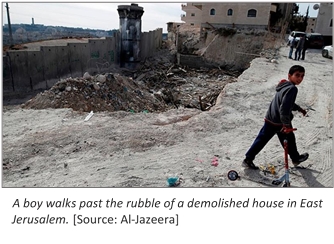 The New Basic Law includes 11 discriminatory provisions such as recognizing the land of Israel as the “historical homeland of all Jewish people who are entitled to enjoy their natural, cultural, religious and historical right to self-determination.” Another provision declares Jerusalem as Israel’s capital, complete and united. It also defines the state symbols, memorials and public holidays based exclusively on Jewish heritage.
The New Basic Law includes 11 discriminatory provisions such as recognizing the land of Israel as the “historical homeland of all Jewish people who are entitled to enjoy their natural, cultural, religious and historical right to self-determination.” Another provision declares Jerusalem as Israel’s capital, complete and united. It also defines the state symbols, memorials and public holidays based exclusively on Jewish heritage.
Furthermore, the law reduces Arabic from an official language to a “special” status leaving Hebrew as the only official language. Additionally, it promotes the establishment and consolidation of Jewish settlements, insisting that it is a national value. By nature, this law automatically excludes and discriminates against Palestinians and other minorities. In some of its recommendations GICJ:
- Urged the Security Council as the main promoter and protector of peace to take initiatives along with the General Assembly and other relevant bodies to remedy this decades-long tragedy by condemning the discriminatory measures taken by Israel (further actions should be taken regarding the unwillingness of Israel to abide by UN resolutions, in particular the 1974 resolution concerning the Palestinian right to self-determination (A/Res/3236 (XXIX));
- Called upon all the relevant bodies to hold accountable those responsible for enacting discriminatory laws such as the New Nation law that would translate into another apartheid; and
- Called on the UN to exert all efforts for the revocation of the New Nation-State Law that explicitly mentions Jewish national rights but fails to do the same for minorities.
Link to full Written Statement.
Burundi – Acts of Violence, Intimidation and Threats by Imbonerakure
The political, humanitarian and human rights crisis in Burundi began in 2015 after President Pierre Nkurunziza sought a third term in the 2015 presidential elections, which consequently sparked protests and widespread demonstrations as the decision was deemed unconstitutional. Since, there have been numerous reports by various United Nations bodies, several non-governmental organisations, as well as on the ground information and witness-testimony that have reported serious human rights violations, atrocities, and abuses in connection with or attributed to the government of Burundi perpetrated against civilians.
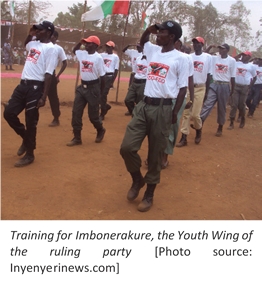 The Imbonerakure are the Youth Wing of the current ruling party CNDD-FDD and was formed in 2010 and has been active ever since. In Burundi’s Third Universal Periodic Review (UPR) Cycle OHCHR-Burundi included the Imbonerakure as one of the groups that committed most of the human rights violations in Burundi, including “summary executions, enforced disappearances, torture and the alleged sexual violence.” In 2017 the UN High Commissioner for Human Rights, Zeid Ra’ad Al Hussein acknowledged the dangerous threat of the Imbonerakure as he strongly condemned their “grotesque rape chants” during rallies in Burundi where they made repeated calls to impregnate or kill party opponents. In 2018, reports have revealed numerous instances where certain groups of people were forced by the Imbonerakure to attend rallies and events of the current ruling party.
The Imbonerakure are the Youth Wing of the current ruling party CNDD-FDD and was formed in 2010 and has been active ever since. In Burundi’s Third Universal Periodic Review (UPR) Cycle OHCHR-Burundi included the Imbonerakure as one of the groups that committed most of the human rights violations in Burundi, including “summary executions, enforced disappearances, torture and the alleged sexual violence.” In 2017 the UN High Commissioner for Human Rights, Zeid Ra’ad Al Hussein acknowledged the dangerous threat of the Imbonerakure as he strongly condemned their “grotesque rape chants” during rallies in Burundi where they made repeated calls to impregnate or kill party opponents. In 2018, reports have revealed numerous instances where certain groups of people were forced by the Imbonerakure to attend rallies and events of the current ruling party.
In order to bring a halt to the abuses committed by the Imbonerakure, GICJ among its recommendations:
- Called on the government of Burundi to hold the Imbonerakure to account for any and all of its illegal activities and violations, and to provide them with human rights training and ensure that their actions are within human rights law;
- Encouraged the East African Community (EAC) and Support Teams for Talks to ensure the full and effective participation of women, civil society organisations, women’s rights groups, grass roots organisations, refugee and minority groups, and youth groups;
- Called on the Human Rights Council to support and allocate appropriate bodies and stakeholders towards providing all necessary technical and financial assistance for the EAC in efforts to build solidarity and immediately re-institute talks for dialogue and implementing peaceful measures in Burundi.
Link to full Written Statement.
Crimes Committed During the War and Occupation of Iraq
This statement focuses on violations of international law during the Iraq War and occupation, and in particular, crimes committed by the United States of America and its allies. The extent of Coalition crimes warrants the establishment of an independent international tribunal that can investigate and prosecute such crimes. This tribunal should also investigate whether the crimes committed during the Iraq War constitute genocide under international law.
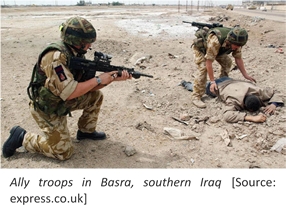 An independent international tribunal for Iraq would strengthen international humanitarian law, provide victims an opportunity to voice the horrors they witnessed and experienced, would bring justice to the persons responsible for them, and would contribute to restoring and maintaining peace. The international tribunal would apply existing international law to which all parties in the Iraq War are bound, including treaty law and jus cogens principles. Thus, among its recommendations,
An independent international tribunal for Iraq would strengthen international humanitarian law, provide victims an opportunity to voice the horrors they witnessed and experienced, would bring justice to the persons responsible for them, and would contribute to restoring and maintaining peace. The international tribunal would apply existing international law to which all parties in the Iraq War are bound, including treaty law and jus cogens principles. Thus, among its recommendations,
GICJ:
- Appealed to the United Nations to urgently endorse an investigation into whether the crimes committed by the Coalition amount to genocide under international law;
- Called on the United Nations to urgently endorse an international tribunal for the prosecution of persons responsible for serious violations of international humanitarian law committed in the territory of Iraq during the initial invasion and then the subsequent occupation of Iraq by the United States and other Coalition members; and
- Requested the Human Rights Council to urgently appoint a Special Rapporteur to monitor and report on the human rights situation in Iraq.
Link to full Written Statement.
Myanmar – The Continued Struggle of Rohingya for Citizenship
The most challenging problem for the Rohingya is that of Citizenship Status. Today, the Rohingya are the biggest community of stateless people in the world. The 1982 Burmese Citizenship Law provides citizenship based on ethnicity which recognized 135 ethnic groups excluding the Rohingya, thus, gravely violating their fundamental rights and freedoms including restriction on their right to freedom of movement, limits on access to lifesaving health care and denial of the rights to education and equal employment opportunities.
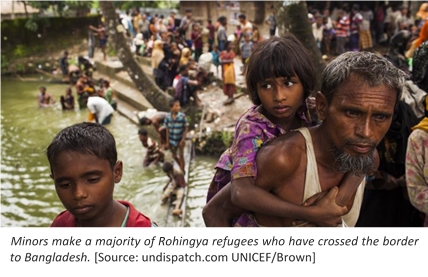
In January 2018, the governments of Bangladesh and Myanmar signed an agreement to allow the physical repatriation of Rohingya Refugees that fled to Bangladesh after the violence broke out against the Rohingya in the Rakhine State of Myanmar. In June 2018, the Tripartite agreement between the government of Myanmar, UNHCR, and UNDP is entered into force. Despite this Memorandum of Understanding (MoU) and the agreement between Myanmar and Bangladesh, the Rohingya have not returned to Myanmar. The government of Myanmar has failed to dismantle any discriminatory laws, policies and practices against the Rohingya which makes it hard or rather impossible for the refugees to return to their homes in the near future.
In some of the recommendations GICJ recommended:
- The Myanmar government dismantle the discriminatory laws, policies, and practices against the Rohingya and to work with the UN Fact-Finding Mission (FFM) and allow access to the High Commissioner, the Special Rapporteur, and the Commission on Inquiry to the Rakhine State; and
- The Human Rights Council ensure the implementation of the Tripartite MoU between the Myanmar government and the UN agencies and to call on the international community for their support to end the atrocities committed against the Rohingya by pressuring Myanmar to abide by its international obligations and responsibilities.
Link to full Written Statement.
The Context of the Conflict in the Democratic Republic of Congo (DRC)
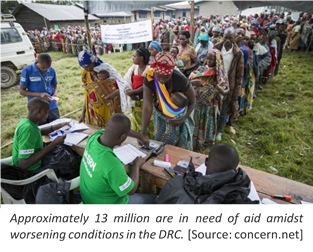 The humanitarian crisis in DRC has gravely affected civilians and the violence and human rights abuses continue to intensify and spread. By the end of June 2018, there were nearly 1,150 cases of cholera reported in the greater Kasai. This was the second outbreak of cholera since the start of the crisis in August 2016. Worse still, the reports have indicated that educational and medical facilities among others are being targeted which only further deteriorates the humanitarian situation and directly affects the lives of thousands of children. According to the 2017 Annual Report of the Secretary-General on children and armed conflict, the fragmentation of armed groups and switching parties and ideologies have contributed to the degradation of the situation of children in the country.
The humanitarian crisis in DRC has gravely affected civilians and the violence and human rights abuses continue to intensify and spread. By the end of June 2018, there were nearly 1,150 cases of cholera reported in the greater Kasai. This was the second outbreak of cholera since the start of the crisis in August 2016. Worse still, the reports have indicated that educational and medical facilities among others are being targeted which only further deteriorates the humanitarian situation and directly affects the lives of thousands of children. According to the 2017 Annual Report of the Secretary-General on children and armed conflict, the fragmentation of armed groups and switching parties and ideologies have contributed to the degradation of the situation of children in the country.
Recent reports have also revealed that aid workers and asylum seekers have been the victims of shootings by Congolese soldiers in South Kivu. Targeting aid or humanitarian workers amounts to war crimes under the Statute of the International Criminal Court as such actions violate the Geneva Conventions of 12 August 1949, which protects aid workers under customary International Humanitarian Law (IHL). In this context GICJ recommended, among others, that:
- The DRC government comply with International Humanitarian Law and International Law especially with respect to aid workers and children, as it is the part of the state's responsibility; and ensure that the training of the National Security Forces is efficient and effective and extend the training to any authority officer; and
- The Human Rights Council to take measures to hold to account Kabila’s clan and any People's Party for Reconstruction and Democracy member for their part in any human rights violations; and to closely monitor the human rights situation prior to and after the December 2018 elections.
Link to full Written Statement.
Truth and Justice with Respect to the Iraq War
This statement focuses on the troubling lack of accountability for the crime of aggression committed through the invasion of the Republic of Iraq in March 2003 by the United States of America. The Coalition committed the crime of aggression when they invaded Iraq in March 2003. To date, there has only been one attempt to investigate the issue of aggression in Iraq. This lack of accountability sets a dangerous precedent. The illegal war in Iraq not only threatens the doctrine enshrined in the Charter but also erodes the foundation of a world order governed by the rule of law.
Since the domestic judicial mechanisms of the United States, other Coalition countries or the victim country (Iraq) may be ineffective in prosecuting or otherwise examining the issue of aggression, there is a need for an alternative and international judicial platform. Like previous international criminal tribunals, an independent international criminal tribunal for the crimes committed in the lead up to the Iraq War will further the cause of justice, enforce and uphold the rule of law, and further international accountability. It will set precedent that no member State can violate the Charter without consequences.
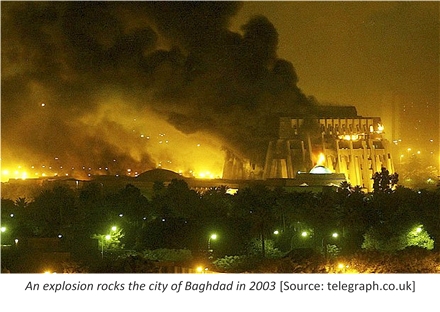
Some of the recommendations given by GICJ were that:
- The Human Rights Council should urgently endorse an international independent investigation and an international tribunal to look into allegations that the United States and the Coalition committed the crime of aggression when they invaded Iraq; and
- The United Nations should condemn crimes of aggression by member states, including the one committed by the United States and the Coalition when they invaded Iraq.
Link to full Written Statement.
Systemic Grave Violations Against Peaceful Demonstrators in Iraq
The right to freedom of opinion and expression, and the right to freedom of peaceful assembly and association are established in articles 19 and 20 of the Universal Declaration of Human Rights and articles 19 and 21 of the International Covenant on Civil and Political rights (ICCPR). Both of these treaties are signed and ratified by the government of the Republic of Iraq, thus the country has an international obligation to comply with these rights.
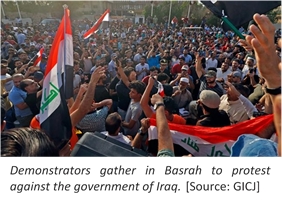 In Iraq however, these freedoms are often not respected. Most recently on the 8th of July, 2018 the Iraqi population began a series of new demonstrations in the cities of Basra, Wasit, Maysan, Diwaniyah, Samawah, Dhi Qar, Najaf, Karbala and the capital Baghdad where demonstrators expressed their frustration about the lack of jobs and basic services, including water and electricity, which only makes the situation in Iraq more and more difficult. Concurrently, there was a very high security alert by government authorities who used threats and intimidation tactics with the help of associated militias, security forces, and party leaders against many of the activists.
In Iraq however, these freedoms are often not respected. Most recently on the 8th of July, 2018 the Iraqi population began a series of new demonstrations in the cities of Basra, Wasit, Maysan, Diwaniyah, Samawah, Dhi Qar, Najaf, Karbala and the capital Baghdad where demonstrators expressed their frustration about the lack of jobs and basic services, including water and electricity, which only makes the situation in Iraq more and more difficult. Concurrently, there was a very high security alert by government authorities who used threats and intimidation tactics with the help of associated militias, security forces, and party leaders against many of the activists.
Among some of the recommendations GICJ:
- Called on the United Nations to condemn crimes of aggression by member states, including the one committed by the United States and the Coalition when they invaded Iraq; and
- Urged the Special Rapporteur on the promotion and protection of the right to freedom of opinion and expression to make a country visit to Iraq.
Link to full Written Statement.
GICJ’s Co-Sponsored Side Events
Toward Peace in Yemen – Human Rights Violations: Root Causes
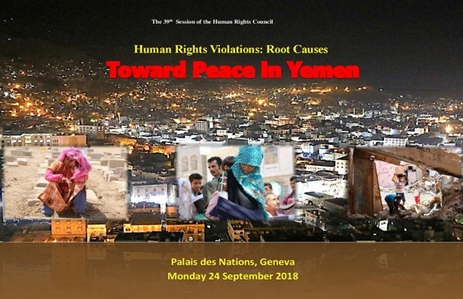
On 24 September 2018, Geneva International Centre for Justice (GICJ) along with International Organization for the Elimination of All Forms of Racial Discrimination (EAFORD), International-Lawyers.Org, and other non-governmental organisations organized and held a side-event on the root causes of the civil war in Yemen.
The war in Yemen has resulted in a humanitarian crisis of tremendous proportions. In responding to the crisis, the UN Security Council, under its Article VII powers, established a framework for interacting with the various parties involved. This framework clearly requires all members states, and the UN, to assist Yemenis in pursuing a negotiated, political solution. Nevertheless, the conflict continues, and additional parties have become involved. It has now reached a point where the entire Yemeni population is suffering daily from shortages of the most basic necessities: food, water, shelter and medicines.
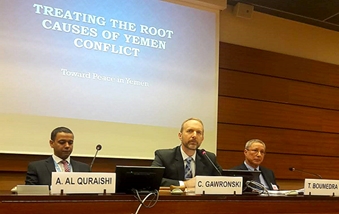
This Side Event examined the impact of the report of the Independent Experts and demonstrated how the Security Council resolutions had been implemented by the concerned parties, member states and the UN itself. It also considered approaches to working toward establishing peace in Yemen and ending the bloody conflict.
The event was moderated by Mr. Christopher Gawronski, who is working with Geneva International Centre for Justice (GICJ). The distinguished speakers were Mr. Ahmed Al Quraishi, a journalist who worked extensively in Iraq, and Mr. Tahar Boumedra who served as chief of the United Nations Assistance Mission in Iraq (UNAMI).
Click here for the full summary.
Watch the full side-event in English or Arabic.
The Case of Iraq: The Human Rights Council and Mass Human Rights Violations
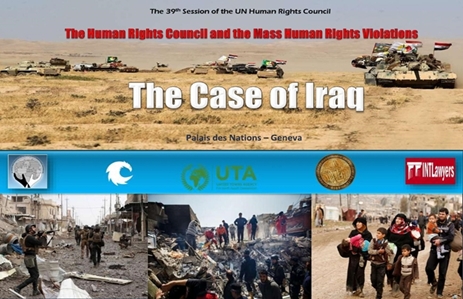
Two former UN officials, who served in Iraq as head of the Human Rights Office in Iraq spoke about their experiences in the country and what the UN should have done in relation to the human rights violations in Iraq. They criticised the overall UN role in Iraq and at the end of their talks suggested that the whole UN presence in Iraq can be better replaced by appointing a Special Rapporteur on the human rights situation in Iraq.
An expert lawyer focused on international criminal justice and he gave his perspective on how to proceed with regard to accountability of the crimes of aggression against Iraq. He also spoke about other war crimes perpetrated during the invasion and occupation and about achieving justice for the Iraqi people. He gave his insight about the UN Human Rights Council and was adamant about change on several levels.
This side event was held on 25 September 2018 and was moderated by Ms. Daniela Donges who is the president of Scales of Justice. The distinguished speakers were Mr. John Pace, the former senior UN Human Rights/Humanitarian official in Iraq, Mr. Tahar Boumedra, former UN Human Rights Chief of the UN Mission in Iraq, and Mr. Inder Comar, a U.S. lawyer and the Executive Director for Just Atonement. The event was co-organized and co-sponsored by Geneva International Centre for Justice (GICJ) together with United-Towns Agency for North-South Cooperation. International Organisation for the Elimination of All Forms of Racial Discrimination (EAFORD), International-Lawyers.Org, along with other non-governmental organisations.
Click here for the full summary.
Watch the full side event in English or Arabic.
Appendix – Council Resolutions & Decisions
NOTE: The summaries and discussions of resolutions provided below contain extracts from the news releases of the Human Rights Council.
Burundi
- HRC Resolution 39/14: Situation of human rights in Burundi
• Adopted as submitted: 23 yes, 7 no (17 abstentions) on 28 Sep 2018
• Introduced by Austria (for the EU)
• Vote requested by Burundi
Summary of the Resolution
• Commission of Inquiry on Burundi to share its report and recommendations with the African Union and all relevant organs of the United Nations for their consideration.
• Extends the mandate of the Commission of Inquiry on Burundi in order to deepen its investigations until it presents a final report during an interactive dialogue at the forty-second session of the Human Rights Council and at the seventy-fourth session of the General Assembly.
• Urges the Government of Burundi to cooperate fully with the Commission of Inquiry.
Introduction of the Resolution
Austria introduced on behalf of the European Union and said the conclusions of the Commission of Inquiry pointed to grave violations of human rights in Burundi. Security forces committed most violations and some of those could be considered as crimes against humanity. It was vital to ensure independent monitoring of the situation in Burundi, and EU regretted that Burundi refused to cooperate with the Office of the High Commissioner and the Commission of Inquiry. Since 2015, 400,000 people had fled Burundi and the Council could not ignore such situation.
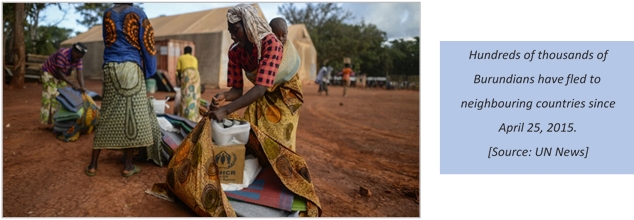
Comments of Concerned Country
Burundi, speaking as the concerned country, was shocked at the content of the resolution, which showed that the Council was politicized by certain countries. It was regrettable that the European Union and its allies had violated the principle of the presumption of innocence, with the only aim being to support the work of the International Criminal Court against Burundi by adopting a resolution that ran counter to previous resolutions. Some countries first set the fire and then wanted to play the role of firemen.
Support of the Resolution
Australia noted with alarm the findings of the Commission of Inquiry. An extension of the mandate had to be supported and the Government of Burundi needs to resume cooperation with human rights instruments.
Opposition to the Resolution
Venezuela and Egypt spoke against the resolution noting it was a politicised action and did not reflect the positive developments in Burundi or the Government’s cooperation with the Council.
Central African Republic
- HRC Resolution 39/19: Technical assistance and capacity-building in the field of human rights in the Central African Republic
• Adopted as submitted without a vote on 28 Sep 2018
• Introduced by Togo (for the Group of African States)
Summary of the Resolution
• Renews, for one year, the mandate of the Independent Expert on the situation of human rights in the Central African Republic to assess, to monitor and to report on the situation of human rights in the with a view to making recommendations related to technical assistance and capacity-building.
• Plans for a high-level interactive dialogue at the fortieth session of the Human Rights Council to assess the evolution of the human rights situation on the ground, placing special emphasis on the participation of civil society, especially women’s organizations and representatives of victims, in the peace and reconciliation process.
Introduction of the Resolution
Togo introduced the resolution on behalf of the African Group and said the resolution addresses several concerns, including ending impunity, reconciliation and restoring peace as well as the insecurity perpetrated by armed groups. The resolution asked that all civilians be protected from sexual and gender-based violence, particularly women and children. The African Group commended the Central African Republic on its continued engagement and supported the objectives of the resolution, including the extension of the Expert’s mandate.
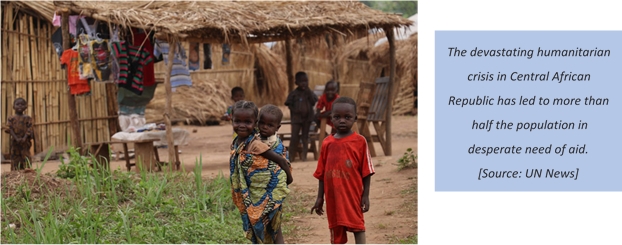
Comments of Concerned Country
The Central African Republic was not present in the Council chamber to comment as the concerned country.
Comments on the Resolution
Slovakia, speaking on behalf of the European Union, commended the draft resolution and engagement by the Central African Republic authorities to improve human rights. The Central African Republic was going through a crucial phase in the determination of its future and the European Union was fully committed to efforts to help them find peace and reconciliation.
Democratic Republic of the Congo
- HRC Resolution 39/20: Technical assistance and capacity-building in the field of human rights in the Democratic Republic of the Congo
• Adopted as orally revised without a vote on 28 Sep 2018
• Introduced by Togo (for the Group of African States)
Summary of the Resolution
• Urges the Independent National Electoral Commission to carry through the steps that remain up to the actual holding of the elections, and requests all stakeholders in the electoral process to refrain from all forms of violence and any discourse inciting racial, tribal or ethnic hatred.
• Demands the Government and all competent institutions of the DRC take all additional measures necessary for the prevention of all violations of international humanitarian law and abuses of human rights and to carry out thorough investigations into all acts of violence and all violations of international humanitarian law and all abuses of human rights.
• High Commissioner to prepare a report on the situation of human rights in the Democratic Republic of the Congo before, during and after the elections of 23 December 2018, and to submit it to the Human Rights Council, within the framework of an enhanced interactive dialogue, at its fortieth session.
Introduction of the Resolution
Togo introduced the resolution on behalf of the African Group and said this resolution took into account the efforts taken by the Government of the DRC to bring those responsible for violence to justice. The resolution also took into account the significant progress made by the National Independent Electoral Commission, including the publication of the list of political candidates at all levels. The DRC was encouraged to take appropriate measures to ensure the proper functioning of mechanisms charged with supporting and promoting human rights in the Democratic Republic of the Congo.
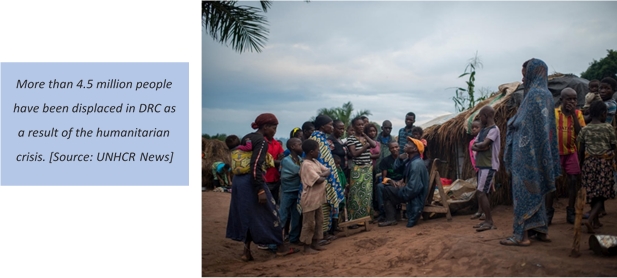
Comments of Concerned Country
Democratic Republic of the Congo, speaking as the concerned country, said the draft resolution was the logical follow-up to the resolution that the Council had adopted last September to assess the situation in the DRC in order to provide technical assistance and capacity building. During informal consultations, there were many proposals by the European Union that did not reflect the reality on the ground and were trying to exercise power over the national authorities. The text was changed a lot to accommodate the European Union, which, as a result, did not provide a coherent capacity building strategy as desired by the DRC. Nevertheless, the African Group worked to create a compromise.
Comments on the Resolution
Slovakia, speaking on behalf of the European Union, and Switzerland spoke in favour of the resolution and expressed deep concern about the situation in the Democratic Republic of the Congo.
Myanmar
- HRC Resolution 39/2: Situation of human rights of Rohingya Muslims and other minorities in Myanmar
• Adopted as submitted: 35 yes, 7 no (7 abstentions) on 27 Sep 2018
• Introduced by Austria (for the EU) and Pakistan (for the OIC)
• Vote requested by China
Summary of the Resolution
• Establish an ongoing independent mechanism to collect, consolidate, preserve and analyse evidence of the most serious international crimes and violations of international law committed in Myanmar since 2011.
• Mechanism to report on its main activities on an annual basis to the Human Rights Council as of its forty-second session and to the General Assembly as of its seventy-fourth session.
• Mandate of the independent international fact-finding mission extended until the new mechanism is operational.
• The fact-finding mission to submit a final report on its main activities to the Council at its forty-second session.
Introduction of the Resolution
Pakistan introduced the resolution on behalf of the Organization of Islamic Cooperation (OIC) and said the Organization of Islamic Cooperation and the European Union had worked closely to agree on the text. The text was their united voice in support of the Rohingya Muslims and other minorities in Myanmar in view of a grave tragedy. The OIC hoped that the Council would stand united for the helpless Rohingya Muslims and other minorities, who had suffered in Myanmar for decades. Austria introduced on behalf of the European Union and noted this was the first time in the Council’s history a joint resolution was presented on behalf of the European Union and the Organization of Islamic Cooperation. The report of the Fact-Finding Mission provided a harrowing account of the human rights situation in Myanmar, pointing to the possible genocide and crimes against humanity committed in Kachin, Rakhine and Shan states by the military and security forces. The Council was urged to adopt the resolution by consensus.
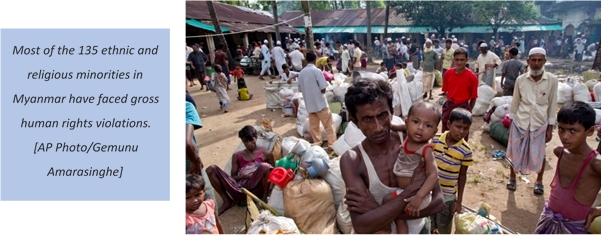
Comments of Concerned Country
Myanmar, speaking as the concerned country, believed the resolution was based on impetuous judgement based on the Fact-Finding Mission’s report, which was full of unverified information and failed to be objective and impartial. The report was unbalanced and seemed to encourage the disunity of the nation by dividing among national races. The Government of Myanmar had rejected the Fact-Finding Mission since the beginning, as its acceptance could have created strong opposition and instability inside the country. Instead, they had set up their own Independent Commission of Inquiry because the Government took allegations of human rights violations seriously. The Government has ongoing efforts to achieve peace and national reconciliation and stated its belief that country-specific resolutions are not conducive to meaningful dialogue but give rise to polarization and confrontation instead. Myanmar considered the draft resolution to contain intrusive language and demands that would not contribute to finding a lasting solution to the delicate and complex situation of Rakhine state. Myanmar requested Council members to reject the draft resolution.
Support of the Resolution
United Kingdom, Brazil, Iceland, and Peru spoke in favour of the resolution and noted the unprecedented nature of the findings in the report of the Fact-Finding Mission. Egypt also supported the resolution but noted its belief that the proposed establishment of an independent mechanism to collect and analyse evidence did not fall within the mandate of the Human Rights Council.
Opposition to the Resolution
China and the Philippines supported assistance for the displaced population and noted positive developments on the part of the Government of Myanmar. Both countries opposed the resolution believing it to be polarizing and likely to lead to a deterioration of the situation.
Other Comments on the Resolution
Japan emphasized the necessity to allow access for United Nations personnel to Rakhine state. Japan commended the commencement of the Myanmar Independent Commission of Inquiry and emphasized that it was vital that Myanmar itself carry out a transparent and credible investigation.
Syria
- HRC Resolution 39/15: The human rights situation in the Syrian Arab Republic
• Adopted as submitted: 27 yes, 4 no (16 abstentions) on 28 Sep 2018
• Introduced by France, Germany, Italy, Jordan, Kuwait, Morocco, Netherlands, Qatar, Turkey, and United Kingdom
• Amendments proposed by Russian Federation
• Vote requested by Cuba
Summary of the Resolution
• Expresses deep concern at the finding of the Commission of Inquiry on the Syrian Arab Republic that tactics used in the recapturing of the besieged area of eastern Ghutah amounted to war crimes and crimes against humanity.
• Expresses profound concern at findings that sexual and gender-based violence against women, girls, men and boys has been a persistent issue in the Syrian Arab Republic since the uprising in 2011, and that women and girls have been disproportionately affected.
• Notes that acts of sexual and gender-based violence were committed most commonly by Syrian authorities and associated militia, as well as by the so-called Islamic State (Daesh), amounting to crimes against humanity and war crimes.
• Expresses deep concern at the situation of the 6.5 million internally displaced persons across the Syrian Arab Republic and urges all parties to ensure that any evacuation and movement of civilians is consistent with international humanitarian law and human rights law.
• Deplores, and calls for immediate repeal, of national legislation which negatively impacts on the rights of displaced Syrians to claim their property and to return to their homes.
• Expresses grave concern at findings that chemical weapons were very likely used in attacks and looks forward to the final findings of the fact-finding mission of the Organisation for the Prohibition of Chemical Weapons.
Introduction of the Resolution
United Kingdom introduced the resolution on behalf of a group of States and said that the human rights situation in Syria remained of grave concern, including attacks against civilians and medical infrastructure. ISIS had taken hostages in areas of southern Syria. The draft made note of recent developments as well as findings of the Commission of Inquiry. Efforts were made to present a balanced text accommodating different concerns. Turkey and Russia were called on to de-escalate actions for the sake of 3 million people living in Idlib.
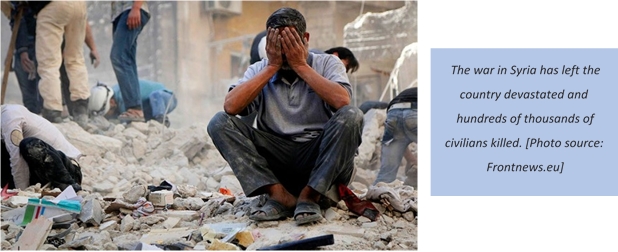
Comments of Concerned Country
Syria, speaking as the concerned country, said that States were attempting to politicise the work of the Council and use it to advance their political agendas. The resolution ignored the situation of foreign interference in Syria and the suffering of Syrian people because of terrorist groups. Syria condemned the resolution, saying that lies and misinformation stripped the resolution of any objectivity and exacerbated the lack of credibility for any such resolutions from the Council. Syria expressed concern that the resolution would violate the rights of Syrian citizens through political coercive measures. Syria said that it stood ready to cooperate with United Nations mechanisms in line with the UN Charter, but that the measures in the draft resolution were not neutral or professional. Syria requested Council members to reject the draft resolution.
Support of the Resolution
Slovakia, speaking on behalf of the European Union, Switzerland, Australia, Ecuador, Mexico, and Brazil spoke in support of the resolution. They urged all parties to provide safe, unhindered and immediate humanitarian access for all those in need, and deplored the use of illegal war tactics, especially chemical weapons.
Opposition to the Resolution
Russian Federation, Cuba, China, and Venezuela spoke against the resolution. They expressed concern that this resolution was of a politicized nature and that it did not respect Syria’s territorial integrity, contribute to counter-terrorism, or truly address human rights violations.
Other Comments on the Resolution
Egypt and Iraq chose to abstain from voting. They believed the resolution moved away from the objective of stopping the hostilities, continued its unequal treatment towards all parties, and failed to address the use of unilateral coercive measures by other states.
Amendments to the Resolution
Russian Federation introduced four amendments to the resolution to ensure it was not a means of supporting militants within the Syrian conflict. Russia called on the Council to separate extremist and terrorist groups from those groups that were ready to support a constructive dialogue for the future peace of Syria. Russian Federation called for large companies and big organizations that came from countries that sponsored the resolution to be investigated for funding terrorist groups. Russian Federation condemned the draconian restrictive measures that some countries had taken against Syria, which have thrown the country backward in its development and violated its sovereign rights.
Cuba and China briefly expressed support for all proposed amendments. All amendments were rejected.
Slovakia (on behalf of the European Union), United Kingdom, Switzerland, Australia, Mexico, Germany, Belgium, Qatar, Georgia, and Australia all spoke against one or more of the amendments. The main concerns were that the amendments were unnecessary, added vague language, and did not recognize that careful targeting of sanctions have been designed to protect civilians in Syria and condemned Syrian authorities for continuing to block humanitarian access to civilians.
Yemen
- HRC Resolution 39/16: Human rights situation in Yemen
• Adopted as submitted: 21 yes, 8 no (18 abstentions) on 28 Sep 2018
• Introduced by Belgium, Canada, Ireland, Luxembourg, and Netherlands
• Vote requested by Saudi Arabia
Summary of the Resolution
• Extends the mandate of the Group of Eminent International and Regional Experts for a further period of one year.
• Group of Experts to submit a comprehensive written report to the High Commissioner for presentation at the forty-second session of the Human Rights Council, to be followed by an interactive dialogue.
• High Commissioner to continue to provide substantive capacity-building, technical assistance and advice and legal support to the National Commission of Inquiry.
Introduction of the Resolution
Canada introduced the resolution, speaking on behalf of Belgium, Ireland, Luxembourg, and Netherlands, and said that the crisis in Yemen could only be solved by a comprehensive political solution. All parties needed to re-engage in the political dialogue in accordance with the United Nations Security Council resolution 2216. The sponsors believed that the work of the Group of Eminent International and Regional Experts was unfinished due to access and time constraints, and it was imperative to give them more time to fully examine the conflict and report on all alleged violations by all parties to the conflict.
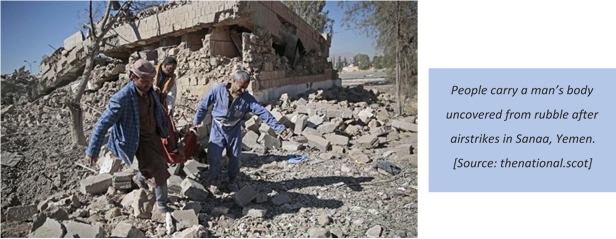
Comments of Concerned Country
Yemen, speaking as the concerned country, deplored that some European countries and Canada had submitted a draft resolution under this agenda item despite intensive consultations that had been held and despite being aware of a draft resolution from the Arab Group on supporting technical assistance and capacity building. Yemen expressed disappointment that the resolution encouraged war and created a situation that responded to the will of certain countries to politicize the situation.
Support of the Resolution
Slovakia (speaking on behalf of the European Union), Germany, United Kingdom, Ukraine, Switzerland, Mexico, Brazil, and Qatar all spoke in support of the resolution. They expressed a need to give the Group of Eminent Experts more time to assess the conflict so that the findings would reflect behaviours of all parties during the conflict, as not all were documented so far. Also, although the National Commission of Inquiry in Yemen was making many efforts, challenges remained for documenting human rights abuses and the Group of Eminent Experts was very important to ensure justice for victims.
Opposition to the Resolution
United Arab Emirates (speaking on behalf of Bahrain), Saudi Arabia, Venezuela, China, and Egypt spoke against the resolution. They were concerned that resolution was not supported by Yemen, that it contained contradictory statements which would exacerbate the conflict and not contribute to a political solution to the conflict.
Other Comments on the Resolution
Japan abstained from voting, saying it was disappointed that consultations had not resulted in a unified resolution. Considering the dire humanitarian and human rights situation in Yemen, Japan said that it considered that some form of international mechanism to be necessary but emphasized that the Council should seek consensus on this mechanism, including from Yemen itself.
- HRC Resolution 39/21: Technical assistance and capacity-building for Yemen in the field of human rights
• Adopted as submitted without a vote on 28 Sep 2018
• Introduced as draft resolution A/HRC/39/L.23 by Tunisia (for the Group of Arab States)
Summary of the Resolution
• Expresses deep concern at the serious abuses and violations of international human rights law and international humanitarian law in Yemen committed by all parties to the conflict
• Demands all parties end the recruitment and use of children
• Invites all UN bodies and Member States to assist the transitional process in Yemen
• High Commissioner for Human Rights to continue to provide substantive capacity-building and technical assistance to the Government of Yemen and its Commission of Inquiry
• High Commissioner to present a written report on the implementation of technical assistance to the Human Rights Council at its forty-second session
Introduction of the Resolution
Tunisia introduced the resolution on behalf of the Arab Group and emphasized that Yemen continued to need the support of the international community and the Human Rights Council in order to face the many challenges causing deteriorating human rights conditions. The resolution called for technical assistance to strengthen the capacity of Yemen’s National Human Rights Commission.
Comments of Concerned Country
Yemen, speaking as the concerned country, expressed gratitude to the Arab Group for their support as well as to others who had drafted the resolution. The complex situation in Yemen required assistance from the international community, and the Government of Yemen was ready to cooperate with the Council and investigate all violations of human rights and international humanitarian law. The Government believed that technical assistance and capacity building would be instrumental in improving the human rights situation in Yemen.
Comments on the Resolution
Belgium (speaking on behalf of a group of countries), Japan, and Venezuela spoke in favour of the resolution, stressing the importance of technical assistance for Yemen.
Indigenous Peoples
- HRC Resolution 39/13: Human rights and indigenous peoples
• Adopted as submitted without a vote on 28 Sep 2018
• Introduced by Guatemala and Mexico
Summary of the Resolution
• Theme of the annual half-day panel discussion on the rights of indigenous peoples during the forty-second Council session will be the promotion and preservation of indigenous languages
• Theme of the annual half-day panel discussion on the rights of indigenous peoples during the forty-fifth Council session will be the protection of indigenous human rights defenders
• Hold a half-day intersessional interactive dialogue on ways to enhance the participation of indigenous peoples’ representatives and institutions in meetings of the Human Rights Council on issues affecting them
Introduction of the Resolution
Mexico, speaking also on behalf of Guatemala, thanked the contributors to the resolution text and stated that it pushes forward the United Nations Declaration on the Rights of Indigenous Peoples. The draft resolution established the themes of the next two panel discussions and also called for an interactive dialogue on improving indigenous participation during meetings and discussions which affected them.
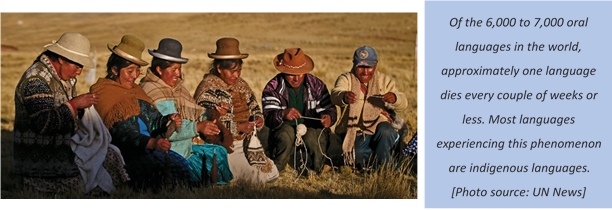
Comments on the Resolution
South Africa, Brazil, and Australia spoke in support of the resolution. They noted the importance of protecting indigenous languages and the people who fight for the rights of indigenous peoples. However, they noted concerns that the resolution may duplicate other efforts undertaken by the General Assembly or would weaken the rights of indigenous peoples and their defenders.
Water and Sanitation
- HRC Resolution 39/8: The human rights to safe drinking water and sanitation
• Adopted as submitted: 44 yes, 1 no (2 abstentions) on 27 Sep 2018
• Introduced by Germany and Spain
• Amendment proposed by Kyrgyzstan
• Vote requested by Kyrgyzstan
Summary of the Resolution
• Calls upon States to:
o Implement Sustainable Development Goal 6 on ensuring the availability and sustainable management of water and sanitation for all
o Ensure the progressive realization of the human rights to safe drinking water and sanitation for all in a non-discriminatory manner while eliminating inequalities in access
o Promote both women’s leadership and their full, effective and equal participation in decision-making on water and sanitation management, (and) ensure that a gender-based approach is adopted in relation to water and sanitation programmes
o Address the widespread stigma surrounding menstruation and menstrual hygiene
o Make efforts to mitigate the disproportionate impact of water, sanitation and hygiene-related diseases on children
Introduction of the Resolution
Spain explained that the orally revised version of the resolution included substantial changes with the goal to further increase the support for the text and to preserve the consensus on this most important issue. Spain emphasized that, along with Germany, it had demonstrated great flexibility during consultations to ensure that everyone would be able to fully support the text and emphasized that the resolution now addressed specific challenges for woman and girls. Spain also highlighted the importance of the 2030 Agenda for the human rights to water and sanitation.
Support of the Resolution
Panama said that it was of vital importance to ensure equitable access to water and sanitation and that the right was vital to the enjoyment of human rights more broadly. Panama noted the grave impact of lack of access to water and sanitation, particularly on women and children who were facing greater obstacles every day. Panama emphasized that the text submitted by the resolution’s sponsors was the outcome of an open consultation process where respect and constructive dialogue prevailed.
Opposition to the Resolution
Kyrgyzstan explained that it had not managed to come to a consensus with the sponsoring States, and, since the Council had rejected its amendment, Kyrgyzstan would be voting against the resolution.
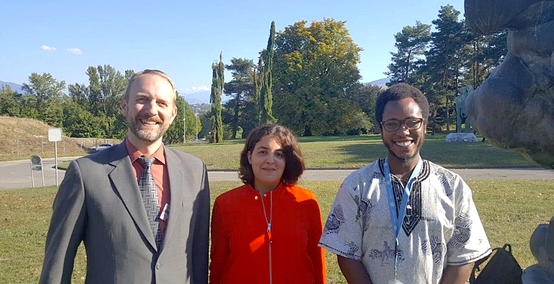
|
Read online or download the full report. |
GICJ's Participation at the Human Rights Council:
|
GICJ Report of the 38th Session of the Human Rights Council Read online or download |
|
|





